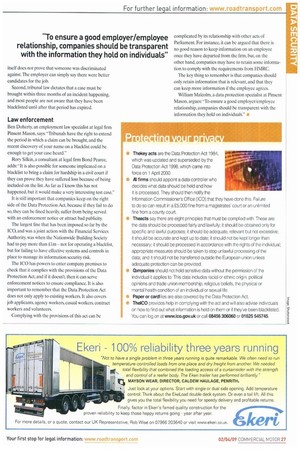Thekey acts are the Data Protection Act 1984, which was
Page 27

If you've noticed an error in this article please click here to report it so we can fix it.
updated and superseded by the Data Protection Act 1998, which came into force on 1 April 2000.
• AI firms should appoint a data controller who decides what data should be held and how it is processed. They should then notify the Information Commissioner's Office (ICO) that they have done this. Failure to do so can result in a £5,000 fine from a magistrates' court or an unlimited fine from a county court.
• Theacts say there are eight principles that must be complied with. These are: the data should be processed fairly and lawfully; it should be obtained only for specific and lawful purposes; it should be adequate, relevant but not excessive; it should be accurate and kept up to date; it should not be kept longer than necessary; it should be processed in accordance with the rights of the individual; appropriate measures should be taken to stop unlawful processing of the data; and it should not be transferred outside the European union unless adequate protection can be provided.
• COmpanies should not hold sensitive data without the permission of the individual it applies to This data includes racial or ethnic origin, political opinions and trade union membership, religious beliefs, the physical or mental health condition of an individual or sexual life.
Paper or cardfiles are also covered by the Data Protection Act. TheiC0 provides help in complying with the act and will also advise individuals or how to find out what information is held on them or if they've been blacklisted. You can log on at www.ico.gov.uk or call 08456 306060 or 01625 545745.














































































































































